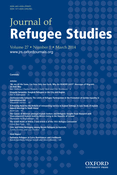-
Views
-
Cite
Cite
Farida Fozdar, Lisa Hartley, Civic and Ethno Belonging among Recent Refugees to Australia, Journal of Refugee Studies, Volume 27, Issue 1, March 2014, Pages 126–144, https://doi.org/10.1093/jrs/fet018
Close - Share Icon Share
Abstract
Australia offers some of the best government-funded settlement services in the world to refugees who come through its official resettlement programme. These services cater to their material, medical and, to some extent, their social needs. However, services cannot provide a sense of belonging to people uprooted from their homelands and transplanted to a culturally and geographically distant place. Or can they? This article explores the facets of belonging identified inductively from a corpus of data from qualitative interviews with 77 refugees living in Western Australia. Thematically, these map clearly onto civic and ethno conceptualizations of the nation-state and belonging within it. While refugees assert their civic belonging in terms of access to services and rights available to refugees and to Australians more broadly, their sense of ethno belonging is much more ambivalent, due to experiences with the mainstream population. Implications in regard to the concept of the nation-state, and for processes of integration and social inclusion, are considered.


